- April 24, 2020
- Posted by: SportsV
- Categories: Event News, Featured Articles, Features, Home News, Industry News, Interviews, News, Press Releases
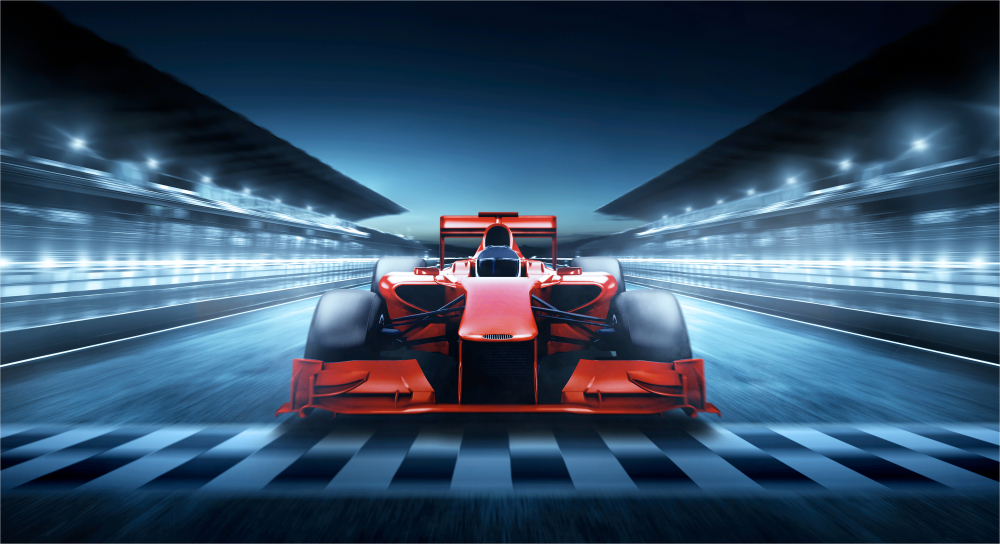
In this latest interview, we hear from industry veteran, Matt Roberts, Director of Research and Analytics at Formula 1®, on how the company is evolving and utilising the latest technologies to deliver on the objectives set out in its recently launched six-pillar Corporate Strategy.
Matt, can you start off by telling us a bit about yourself, your background and career highlights to date:
I began my media career some eighteen years ago and have benefitted from extensive media owner experience across radio, press, online and TV. After graduating in French and German from Bath University, I joined the Millward Brown graduate trainee programme, working on a number of marketing tracking studies for the likes of the Post Office, Bacardi and GSK. After building up a solid understanding of media research at Millward Brown, I joined the research team at GWR radio (now GCAP) and played a key role in the award-winning Brainwaves research project, which proved that radio listeners are more likely to respond to advertising on classical music radio stations than pop stations. I then spent four years in the national newspaper market, taking on senior planning roles at both The Sun and Daily Mirror working primarily across the retail and finance sectors. In 2008, I joined Eurosport as Head of Research, before moving to ESPN UK in 2010, where I headed up the EMEA Research team. There, my team focused on devising a quantitative/qualitative research strategy with the ultimate objective of growing subscribers and audience across all ESPN TV and Digital brands. After the sale of ESPN TV to BT in July 2013, I joined the BT Sport team in Stratford to set up the insight function for the brand new sports channel before joining Sky to head up their sports insight division. In 2017, I joined Formula 1® as Global Research Director/Director of Research and Analytics.
Here at Formula 1®, my role is focused all around strategic insights, so we produce data and research, and essentially any kind of insights and numbers that help the business answer the various strategic questions. One of the big questions we were asked/gaps we had in our knowledge at F1®, was around how people behave when they attend races. What is the fan experience actually like? Then there were a few things we recommended, including asking fans about their experience. For instance, we set up a big market research project where we interviewed basically 30,000-40,000 fans each year, which we’ve done for the last 3 years, and asked them about their experience and how we could improve, etc.
The other area, because you can always ask people what they think about the event, they don’t know exactly how many miles they’ve walked, where they’ve been, etc. For example, if I asked if they’d been to the Fan Zone, they might think “Oh yes, I bought something from a shop, that must have been the fan zone”, but in your head you might not actually know whether that was the fan zone or not. Fans don’t tend to know exactly where they’ve been, which is why we set up sensors all around eight circuits a year, so we can understand exactly how fans are moving around, we know what time they entered the circuit, what time they left, which areas they went to, if they went to any of merchandise mega stores, which food and drink concessions they went to, etc. We know from fan behaviour that the longer they stay at the circuit, the more money they spend and the happier they are.
The reason this data is so important, is that it helps us understand where to put the most important things, like if it’s a race, a pit stop or a race simulator, which are really popular attractions; as well as being immersive and activational. So we know fans will be happier, will spend more money, etc. From this data, we know if we’re putting our food and drink in the right place. If there’s an area where there’s lots of people but there’s no F&B or activations, we can start to answer those kinds of questions, to really understand around our fan behaviour. That piece of work has been shortlisted for quite a few awards, including the Sports Technology Awards, where we’ve been shortlisted three times in the category of ‘Best Technology for Sports Commerce’. Once for our F1 Fan Voice Online Research, where we built a Fan Community with Goodform, where fans can go online, answer surveys, do polls, win tickets, etc., all of which really helps us with our research. Another one was for our Project Fanzone Sensor Technology, where we worked with Meshh. And thirdly for our Winning Hearts and Minds with Biometrics, where we worked with Populus, which really helped us improve the TV experience, as we have a panel of people who wear a device on their hand at each race, which measures their skin’s response, so we know if they’re engaged or not engaged, simply by their sweat levels! So through those people and their responses, we now know where people are most engaged at a race and perhaps more importantly, where they’re not, so we can improve the experience and the sport for future fans. Obviously due to COVID-19, this has all had to stop, so we’ll look to re-start in 2021.
We launched our first ever Corporate Strategy last year. And as a sport, thanks to all of the data and insights we’ve been able to capture, we now know where our future goals and objectives are in business. We’ve never really had a corporate strategy before, it was all about racing, so it’s been great to be able to build a strategy using all of the data and insights that we’ve been able to capture. Our strategy resolves around putting our fans first, improving the fan experience at races, the touch-points, social media, TV, esports, etc.
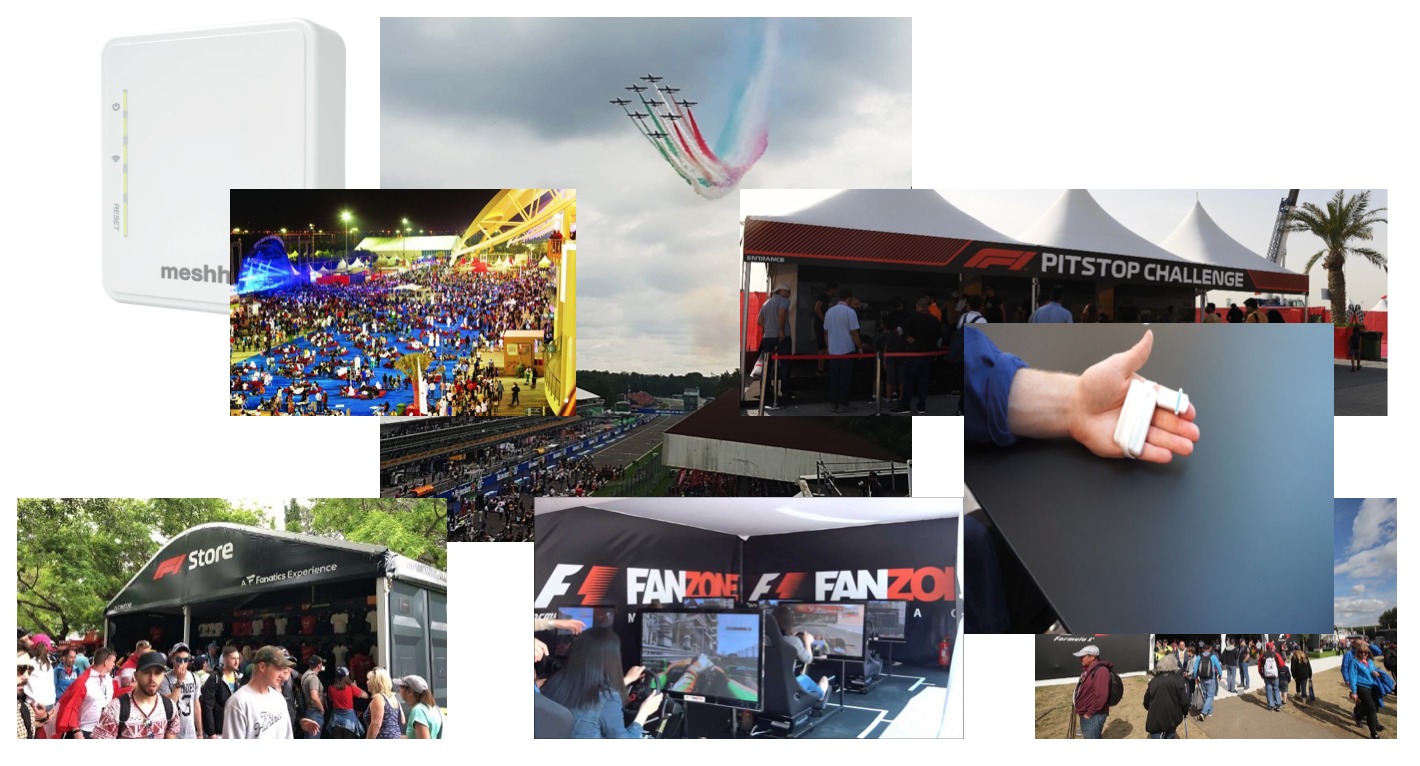
As Director of Research & Analytics for Formula 1®, what are your main objectives for the next 2-3 years (taking COVID-19 into account)?
On a macro level, getting Formula 1® back racing and getting our business model back to normal, is obviously our number one objective.
At a micro level, for me and my team, we have a number of things we still want to do this year, albeit in a slightly scaled back way. We want to really get a grip on our global fan number; we don’t really have an accurate number of how many fans we have. So we really want to understand our global fan numbers. We want to do lots of work across multiple markets to understand the fan engagement, and how does that differ from different regions, different countries. We get some snippets of information from Nielsen but it’s not thorough enough for our needs. That was always going to be our objective for this year but obviously that’ll have to be put back a bit now due to COVID-19. Hopefully we can get it back up and running later in the year.
The other area we really want to start spending a lot more time focused on is the area of data analytics. If you look at the world I work in, research and data, traditionally it’s always been about surveys. But over the last few years, data analytics has come to the fore and is recognised as being much more important. So we’ve started on a low base at F1, as when I joined, we didn’t have much data in our database, there wasn’t much data being stored, so we pretty much started from scratch and have built it up over the last 3 years. One of our goals is to gain much more insight from that data to help us to improve across various areas of the business, from selling more race tickets, more merchandise, or to getting more people to watch races. Data analytics is therefore one of our key objectives.
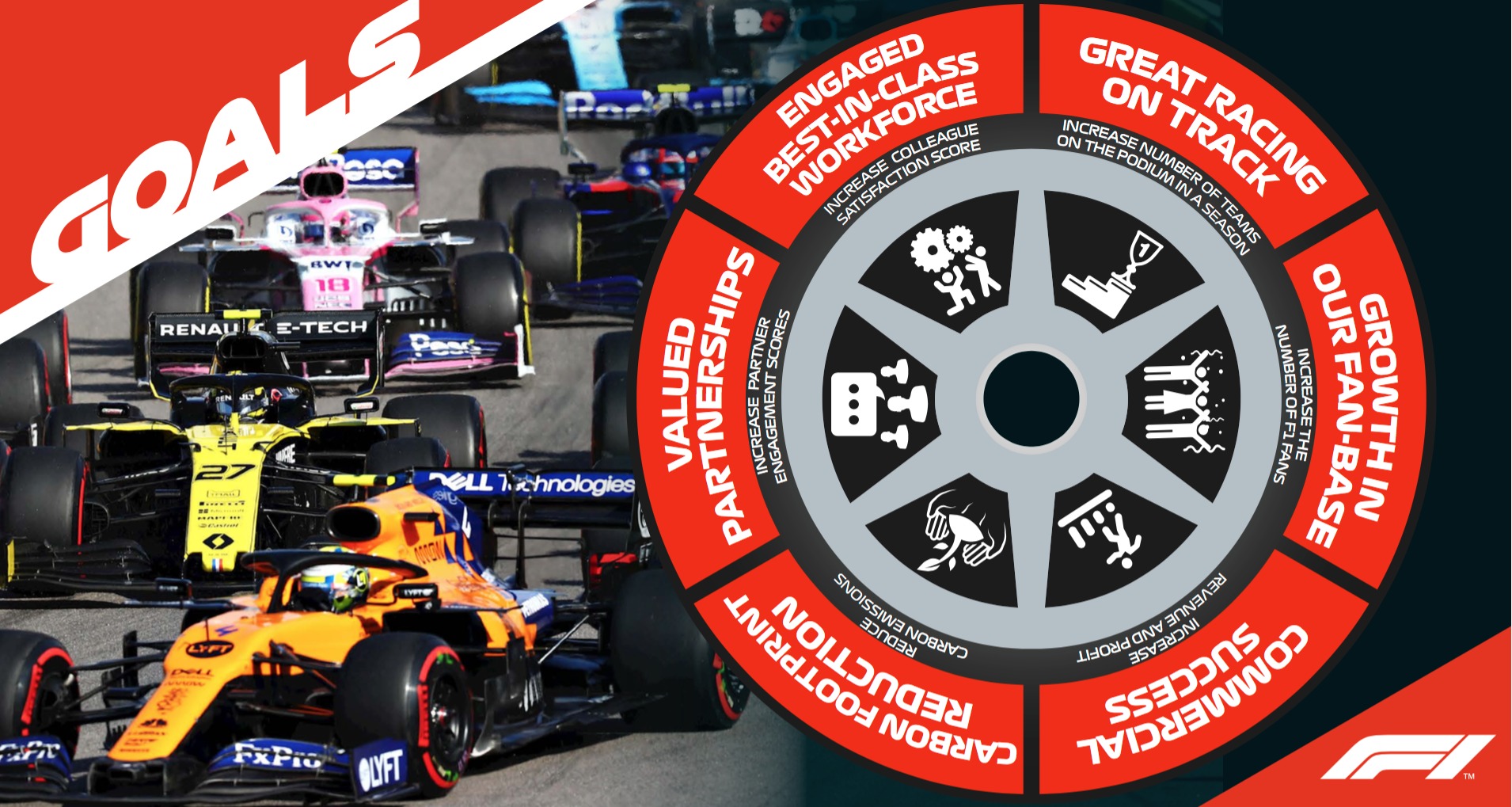
The COVID-19 pandemic has caused chaos for sporting events and organisers the world over, with Tokyo 2020 and EURO 2020 among some of those being postponed to 2021, even 007 has been furloughed. However, despite the fact there are no physical Formula 1® races, the Virtual Formula 1® Grand Priz Series has proved hugely popular. What learnings would you pass on to other colleagues in the sector?
It’s been a good way to keep us in the limelight for a bit longer! I think the challenge we have as a sport is something that other sports don’t have, in that you can’t play Formula 1®. So whereas lots of people become fans of a sport by playing it as a kid, that’s not something you can do with Formula 1®, so we have a unique challenge. But esports is perfect to bridge that gap; it’s a great way to engage younger fans. For example, we know that 80% of people who are watching our esports/Virtual Grand Prix series, are under 35 and that’s a difficult profile to attract in live sport. Under 35s are really hard to come by, because they’re doing lots of other things on their tablets, their phones, whatever.
So the learning is if you’re a sport and you’ve not yet tried esports, then try it. It’s a great way to engage really commercially-attractive young fans that we were previously having difficulty attracting. What we’ve found is that when we have the drivers involved, they drive even better with the bigger numbers we’re now getting.
People are giving lots of positive feedback on social media about the esports Grand Prix Series, they’re very positive about the virtual races, and actually what’s good for us is the fact that there’s not much else on the Sky Sports schedule, so there’s little or no competition, putting F1 to the forefront! It’s been a really good way to expand the sport into a new demographic.
As you know, Formula 1® is an ageing sport – in Europe, our average age is well into the 40’s – so we needed something to keep the sport a bit fresher. Esports has been really positive for us; it’s been a great entry point for us to get younger people who maybe wouldn’t have become an F1 fan otherwise.
The Netflix series has also been the number 1 entity to help us improve engagement across a younger profile.
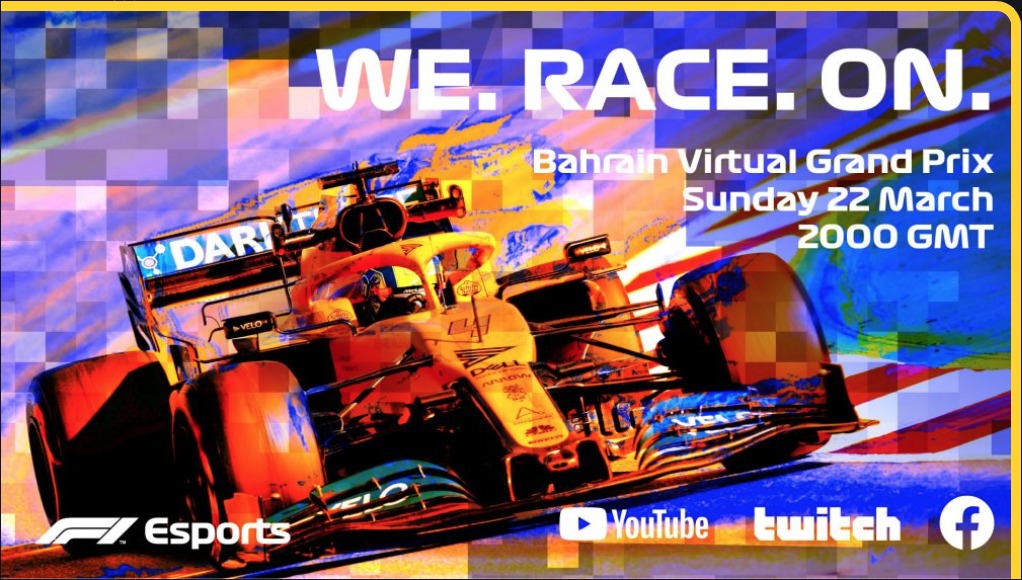
How do you ensure the best data capture and utilisation to ensure delivery of the best product for your fans, partners, rights holders, sponsors, stakeholders, etc?
We’re been quite lucky in some ways, as we didn’t have much data pre-2017, before Liberty Media came on board. So whilst other businesses have struggled under GDPR and they’ve had to throw away lots of datapoints, and start again from scratch, we never had that. We were able to start afresh, meaning our data is all GDPR compliant. We’re confident that we’re growing our database every year and we’re doing more with that database.
What you’d probably find now is that there’s a lot more Formula 1® correspondence going out through email marketing, telling fans when the next races are going to be, what they can expect from the races, other innovations that we’ve got, details on tickets, competitions, etc. That data has helped us develop a whole new area for us, which is email marketing; something we’ve never done before.
In terms of the research we do, all the research goes to our sponsors, our teams, our race promoters, etc. In terms of ensuring it’s the best research possible, we use the big, reputable agencies, like the Market Research Society, accredited agencies like Nielsen, Populus, etc. We use a lot of agencies to make sure that data is impartial, neutral, and not biased in any way. We’re trying to use the latest innovations in technology in that area, so things like biometrics, wearable technology, etc. We’re constantly looking at ways to evolve and by doing this, we are then engaging our internal stakeholders and our customers to use our research, as before they were getting a bit survey-fatigued, so we recognised we needed to innovate and do new things.
You are one of the 45+ industry expert speakers confirmed to share insights at ALSD International – Europe’s leading event for the Premium Seat & Sports Hospitality sector – being held at Liverpool Football Club’s Anfield Stadium this October 12th and 13th. What are the benefits of attending industry events and what are you hoping to get out of this event?
I go to quite a lot of industry events and it’s always really interesting to see what other sports businesses, in particular, are doing and how they’re innovating.
Networking is also really important at these events. If anything actually 95% of the time I go away from an event bringing the networking bit away more than the actual papers I’ve given; because you remember the people that you’ve met and the people that you might want to do business with in the future. The sports sector is actually quite small, so you tend to meet the same people, making networking really, really important.
It’s a great chance for the industry to get together and I always get quite a lot out of these events.

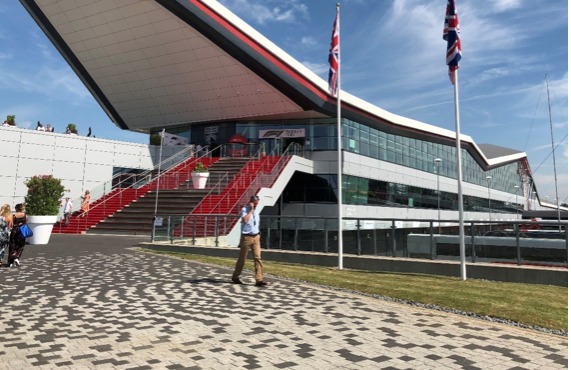
On the subject of Premium Seating & Sports Hospitality – a niche in which Formula 1® is at the forefront – are there any interesting insights or learnings you can share?
Obviously Formula 1® has the Paddock Club™, which is our premium product. We have conducted research every year on the Paddock Club™ offering for the past three years and have spoken to around 5,000 guests in total, 99% of them rate the Paddock Club™ as 4 out of 5 or 4.5 out of 5. They are very positive about their experience.
We also do lots of research with Nielsen about how Formula 1®’s Paddock Club™ guests compare to premium guests of other sports events, and you find that our guests are nearly 50% CEOs or senior management, compared to 35% for other sports hospitality offerings.
Most of our guests tend to come from the IT, banking or engineering sectors.
Another really interesting fact is that 90% of people who go to the Paddock Club™ said it makes them more likely to do business with their host, compared to 84% for other sports events. So it’s definitely a very positive networking setting.
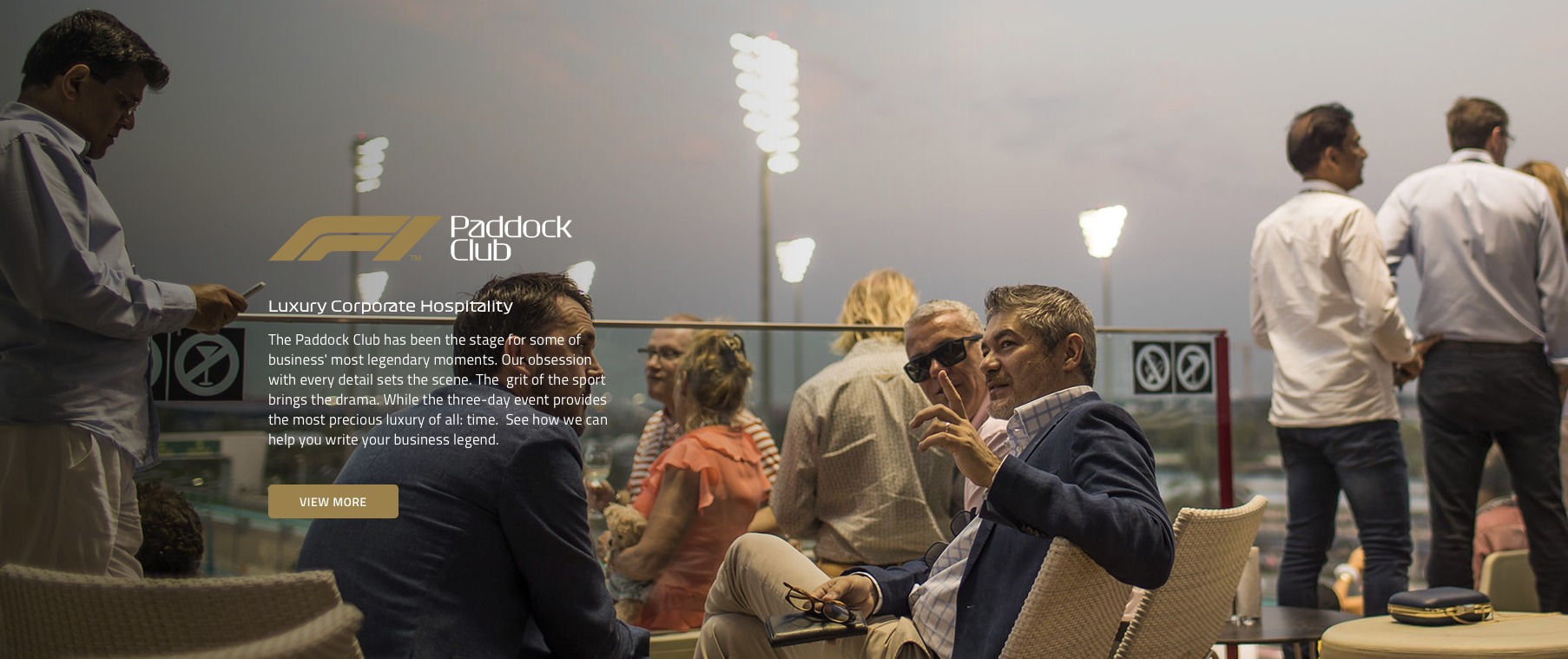
Finally, how do you see the sector evolving post COVID-19?
For my particular area, I think things like data analytics is going to become more important in the industry. I think sport in particular has lagged behind on the data side compared to other industries, like banking and media. If you look at most sports organisations, their data and research ‘team’ consists of 1-2 staff, whereas the likes of Sky has 450 data analysts. So we have to look at how underdeveloped we are in this area and realise that data is going to become much more important moving forward.
Obviously, let’s hope the hospitality sector gets back to normal again, and I think when it does, it’s one that’s going to keep growing in the future. We’ve seen hospitality numbers at Formula 1® – prior to this year – getting bigger and bigger every year, and this trend looks likely to continue.
The challenge for us is to try and evolve our hospitality product. We’re thinking about offering lots of different levels of hospitality, with different tiers, to attract people that may not be able to pay that premium price with cheaper options, that want to buy the seat-plus option. That’s definitely an area where we need to evolve and learn from others doing it well; like Manchester City Football Club, where the hospitality is amazing. They have lots of different entry points, they even have a pub, where you can sit down and have a pie and a pint! I think all of us in the sports industry are trying to find new ways of doing things. People are now willing to pay more for a better experience, so hospitality is definitely one to watch!
Huge thanks to Matt Roberts for taking the time to do this interview with Sports Venue Business CEO, Katie McIntyre, and we can’t wait to hear further insights from Matt at this October’s ALSD International event taking place at Liverpool Football Club’s Anfield Stadium.
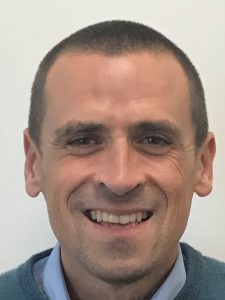
About Formula 1
Formula 1® celebrates its 70th year in 2020. Having grown from a seven-race calendar in 1950, it is now the world’s largest annual global sporting event, racing in 22 countries across 5 continents.
Formula 1® boasts over half a billion passionate fans supporting the world’s best drivers and constructors, who have become household names and cultural icons. F1 has been at the forefront of automotive engineering and has pioneered technology that has transformed road safety and efficiency.
Since Liberty Media took over custodianship of Formula 1® in 2017, the business has changed how it goes-to-market with more open and collaborative ways of working, a solutions-focused attitude to new opportunities, and a commitment to having its fans at the heart of everything it does.
Looking forward, the next chapter in Formula 1®’s history could be its most important yet. It has built a strategy to ensure long-term sustainability for Formula 1® based around six strategic priorities:
• Race: Increase competitiveness and unpredictability on track
• Engage: Produce world-class spectacles for fans on and off track
• Perform: Drive value for stakeholders
• Sustain: Deliver sustainable and efficient operations
• Collaborate: Create win-win relationships with partners
• Empower: Build an engaged, high-performing workforce
This is a plan to inspire and excite fans with great racing on track, engage with new audiences across the globe and deliver increasing returns to stakeholders. This is a plan to “unleash the greatest racing spectacle on the planet”.
Corporate Strategy imagery, courtesy Formula 1: https://corp.formula1.com/wp-content/uploads/2020/01/Formula-1-Strategic-Plan011320.pdf
Main image (top), courtesy: Image Craft via Shutterstock
#esports #formula1 #F1 #Hospitality #SportsHospitality #SportsBiz #sportsentertainment
Matt Roberts is one of 45+ industry experts that will be speaking at the 2020 edition of ALSD International – Europe’s leading event for the Premium Seat & Sports Hospitality sector – taking place at Liverpool FC’s Anfield Stadium this October 12-13. The high-level conference will examine how to increase revenue through new builds, renovations & service expansions, as well as via the latest technologies, and how to recoup lost revenue due to COVID-19. The event is organised and delivered by the Association of Luxury Suite Directors (ALSD) in conjunction with Sports Venue Business (SVB).
The 2020 edition of ALSD International will also feature an exhibition hall showcasing the latest products, services & solutions, as well as behind-the-scenes tours of Anfield Stadium, Goodison Park and M&S Bank Arena, in addition to numerous networking events, including 1-on-1 meetings, ensuring optimised opportunities to knowledge-share, network and do business.
#ALSDInternational – Europe’s leading event for the Premium Seat & Sports Hospitality sector
#ALSD – Leading the Premium Seat sector for the last 30 years
#sportsvenuebiz
#sportsvenuebusiness – The leading platform for sector news, views & developments


